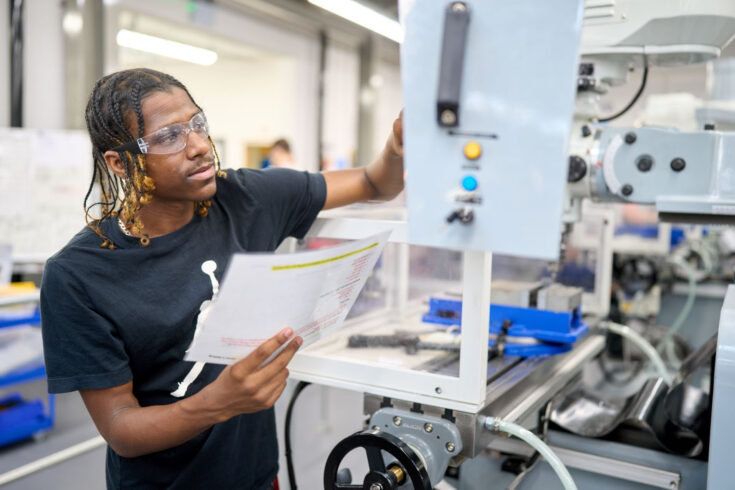When you think about what FECs are and what they do, it quickly becomes clear that they are bound to have a significant effect on their local economies.
Far more than being education providers, FECs are becoming increasingly important in our innovation ecosystems. As place-based anchor institutions, they have an important role to play in supporting local growth, making them well-positioned to increase the capacity and capability of local businesses.
To support this opportunity, Innovate UK has today announced the Further Education Innovation Fund (FEIF). This is a £7.3 million investment in supporting FECs to drive local business innovation and take a central role in their local innovation ecosystem.
The role of FECs
FECs offer high-quality academic, technical and vocational education to people of all ages. Across the UK, there are 270 colleges providing students with the valuable skills needed to enter the labour market.
The colleges offer a broad suite of qualifications and courses in levels one to six, ranging from higher national certificates and diplomas to apprenticeships, and postgraduate degrees.
With strong links to local businesses, typically small and medium-enterprises (SMEs), they play a big part in supporting local skills needs, both current and future. For example, they support apprenticeships, facilitate work placements, and co-produce courses (and component modules) within businesses.
Putting FECs at the heart of innovation ecosystems
Research from the Gatsby Foundation and the Innovation Caucus indicates that FECs possess the expertise and resources to significantly contribute to business innovation in their area. However, they need extra capability to fully realise these opportunities.
Key to this programme is the establishment of local innovation centres. FECs will utilise funding to create and manage these centres, becoming dynamic hubs that actively drive local business growth. These centres will catalyse innovation by engaging with businesses in key sectors of their local economies.
Funding will enable colleges to have more of a prominent role in innovation, particularly when it comes to working with SMEs. Working closer with local businesses and other key stakeholders, such as combined and local authorities will enable FECs to have more scope to understand the innovation needs of their area.
Colleges in innovation accelerator city regions
Innovate UK has worked with the Glasgow City Region, the Greater Manchester Combined and the West Midlands Combined Authority to identify nine projects, involving 33 colleges, to receive investment from the FEIF pilot.
These will be distributed across strategic groups including innovation accelerator city regions, listed above, and alongside ‘innovation mission’ colleges identified by the Association of Colleges and the Gatsby Foundation.
Building on local strengths
Through the creation of local innovation centres, colleges will establish and manage centres and advisors. This will enable them to proactively identify and engage with relevant businesses in key sectors of their local economies.
They will help businesses understand how they can adopt innovations in technologies, business models and processes, using their expertise and infrastructure. In turn, supporting a thriving ecosystem for innovation that actively drives local business growth.
Each local innovation centre tailors its approach to the specific needs of local businesses, these include:
- the Glasgow City Region College Innovation Network, led by Glasgow Kelvin College and including six colleges in Glasgow City Region, aims to enhance business productivity through the development and deployment of digital capabilities
- the Greater Manchester Further Education (FE) Innovation Programme, led by the Oldham College and including all nine colleges in Greater Manchester, will place four innovators in residence in the areas of advanced materials and manufacturing, health innovation and life sciences, digital and creative and clean growth
- the Birmingham Innovation Centre Partnership, led by Birmingham Metropolitan College, and including six colleges in the Birmingham area, targets digital technology adoption within SMEs in sectors such as advanced manufacturing, engineering, dental, and construction
- the Black Country FE Innovation Service, led by Walsall College and including five colleges in the Black Country will allow businesses access to their state-of-the-art facilities and expert guidance around technologies in key growth sectors
- Driving SME Innovation in the West Midlands, led by Coventry College and including three colleges in the area will drive business innovation in digital and green technologies
- the Runshaw Institute of Skills and Enterprise based at Runshaw College has a focus on developing agriculture and SMEs through innovative immersive technology
- Loughborough College will run the Innovation Through AI programme, providing innovation training on artificial intelligence (AI) for data analysis
- the South Hampshire Business Innovation Centre, based at South Hampshire College Group will establish specialist innovation centres in engineering, digital, and health and social care sectors
- Chelmsford College will run the Inclusive Employment, Innovating Businesses programme, addressing labour market inequalities to improve recruitment and retention in key local sectors
Gaining a deeper understanding
The current phase of the programme aims to deepen our understanding of FECs’ role within the innovation ecosystem and the practical barriers they face. We anticipate that their work will instigate real change within businesses by facilitating place-based innovation and business growth.
Innovate UK aspires to supercharge innovation, boost productivity, stimulate economic growth, and create high-quality jobs, enriching the lives of local communities. In essence, the FEIF is about harnessing the power of place to foster innovation and drive positive change right where it is most needed.
If you’re a business interested in innovating, then we encourage you to speak with your local college today to see how they can support your needs.
Further information
Follow Innovate UK on Twitter
Connect with Innovate UK on LinkedIn
Follow Innovate UK on Facebook
Go to the Innovate UK website
Go to the Innovate UK EDGE website
Sign up to our newsletter




